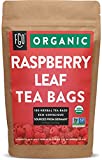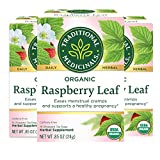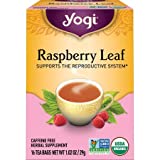Raspberry Leaf Tea for PCOS

Polycystic ovary syndrome (PCOS) is a common hormonal disorder that affects women of reproductive age. It is characterized by a variety of symptoms and health complications, which can vary among individuals. Some of the key features of PCOS include:
Irregular menstrual periods: Women with PCOS may experience infrequent, irregular, or prolonged menstrual cycles.
Elevated levels of male hormones (androgens): Women with PCOS often have higher levels of androgens, such as testosterone, which can cause physical signs like excessive hair growth (hirsutism), acne, and male-pattern baldness.
Polycystic ovaries: The ovaries may become enlarged and contain numerous small, fluid-filled sacs (follicles) surrounding the eggs. These ovarian cysts may be detected by ultrasound, but not all women with PCOS have visible cysts.
A healthy diet plays a crucial role in managing the symptoms of polycystic ovary syndrome (PCOS) and reducing the risk of associated complications. The main goals of a healthy diet for women with PCOS are to improve insulin sensitivity, regulate blood sugar levels, maintain a healthy weight, and support overall health.
What is raspberry leaf tea and what benefits does it have?

Raspberry leaf tea is an herbal tea made from the leaves of the red raspberry plant (Rubus idaeus). It has been used for centuries in traditional medicine, particularly for women’s health issues such as menstrual cramps, heavy periods, and improving uterine health.
The leaves of the raspberry plant are dried and then steeped in hot water to create the tea. Raspberry leaf tea has a mild, slightly sweet flavor and is often described as tasting similar to regular black tea but without the caffeine content.
Raspberry leaf tea is rich in vitamins and minerals, including magnesium, potassium, iron, and B vitamins. It also contains antioxidants and tannins, which are thought to contribute to its potential health benefits.
Some of the proposed benefits of raspberry leaf tea include:
Rich in antioxidants: Both raspberry fruit and leaf teas are rich in antioxidants, which help protect the body from the harmful effects of free radicals and may reduce the risk of chronic diseases.
Supports immune system: Raspberry tea is high in vitamin C, which plays a crucial role in supporting the immune system and maintaining overall health.
Promotes digestive health: Raspberry tea, particularly the fruit tea, contains natural compounds that may help soothe the digestive system and relieve issues such as indigestion and constipation.
Nutrient-rich: Raspberry leaf tea is high in vitamins and minerals, including magnesium, potassium, iron, and B vitamins, which can contribute to overall health and well-being.
Hydration: Drinking raspberry tea can help keep you hydrated, especially when consumed as part of a balanced diet and healthy lifestyle.
May improve heart health: Some studies suggest that the antioxidants in raspberry tea, particularly the fruit tea, may help lower blood pressure and reduce the risk of heart disease.
It is essential to note that while there are many anecdotal reports and traditional uses of raspberry leaf tea for various health issues, scientific evidence supporting these claims is limited. If you are considering using raspberry leaf tea for any health condition, it is best to consult with a healthcare professional before starting any new treatment.
Raspberry leaf tea for PCOS
Raspberry leaf tea has been traditionally used for various women’s health issues, and some anecdotal evidence suggests that it may provide general benefits for reproductive health. Some of these benefits may indirectly support women with PCOS or hormonal imbalances:
Uterine tonic: Raspberry leaf tea is believed to help tone and strengthen the muscles of the uterus, which may improve menstrual cycle regularity. This could potentially benefit women with PCOS who often experience irregular periods.
Menstrual cramp relief: Some women find that raspberry leaf tea helps reduce the severity of menstrual cramps. While this may not directly address the hormonal imbalances associated with PCOS, it can provide relief from a common symptom.
Nutrient-rich: Raspberry leaf tea is high in vitamins and minerals such as magnesium, potassium, iron, and B vitamins. These nutrients can contribute to overall health, and a healthy body is better equipped to maintain hormonal balance.
Why Choosing Organic Tea Matters for Your Health
It’s important to consider buying organic tea for several reasons, including environmental, health, and quality factors:
Healthier option: Organic tea is grown without the use of synthetic pesticides, herbicides, or fertilizers, which means it typically has lower levels of chemical residues than non-organic tea. This can reduce your exposure to potentially harmful chemicals, making organic tea a healthier choice.
Environmental benefits: Organic farming practices emphasize sustainable and eco-friendly methods, promoting a healthier ecosystem. By avoiding synthetic chemicals, organic tea farming helps protect soil, water, and air quality, as well as biodiversity.
Improved taste and quality: Organic tea production often focuses on the quality of the tea leaves, prioritizing the use of natural fertilizers and sustainable practices. This attention to quality can result in a better-tasting and more flavorful tea.
Supporting ethical practices: Organic farming can provide better working conditions for farmers by reducing their exposure to harmful chemicals. By purchasing organic tea, you support companies that prioritize the well-being of their workers and the environment.
Steeped in Danger: The Hidden Toxins Lurking in Plastic Tea Bags

Plastic tea bags can potentially be harmful due to the leaching of chemicals when the bags are exposed to hot water. Most plastic tea bags are made from food-grade plastics such as PET (polyethylene terephthalate) or PLA (polylactic acid). When heated, these plastic materials can release microplastics and other potentially harmful substances into the tea. Here are some concerns related to plastic tea bags:
Microplastics: Studies have found that plastic tea bags release a significant amount of microplastics into the tea when steeped in hot water. These tiny plastic particles can be ingested, and the long-term health effects of microplastics consumption are not yet fully understood.
Chemical leaching: When plastic tea bags are exposed to hot water, they may release chemicals like phthalates, BPA (bisphenol-A), and other endocrine disruptors. These substances can interfere with hormone regulation in the body and have been linked to various health issues, including reproductive problems and developmental disorders.
Environmental impact: Plastic tea bags contribute to plastic pollution, which is harmful to the environment and marine life. The microplastics released from plastic tea bags can accumulate in the environment and enter the food chain.
Keep in mind that while these options may have benefits, personal preferences and budget should also be considered when making your choice.
The Best Raspberry Leaf Teas for PCOS: 100 % Organic and Toxic Free

Organic Red Raspberry Leaf Tea Bags | 100 Tea Bags | Eco-Conscious Tea Bags in Kraft Bag

Traditional Medicinals Organic Raspberry Leaf Herbal Tea Caffeine Free, 16 ct. (Pack Of 3)

How many cups a day?
The optimal daily intake of raspberry tea can vary depending on individual preferences and tolerance. Generally, 1-3 cups of raspberry leaf tea per day is considered a safe amount for most people, and this is the typical range recommended by herbalists.
How to add raspberry leaf tea to your diet

Incorporating raspberry leaf tea into your diet is relatively simple, and there are various ways to enjoy it. Here are some suggestions for adding raspberry leaf tea to your daily routine:
Drink it as a hot tea: The most common way to consume raspberry leaf tea is by brewing it as a hot tea. To make the tea, steep 1-2 teaspoons of dried raspberry leaves in 8 ounces (240 ml) of boiling water for 5-10 minutes. Strain the leaves and enjoy the tea on its own or with a little honey or lemon if desired.
Enjoy it as an iced tea: Raspberry leaf tea can also be served cold, making it a refreshing drink for warm days. Brew the tea as you would for hot tea, but use a little more dried leaves to create a stronger flavor. Let the tea cool, then pour it over ice and add a slice of lemon, a sprig of mint, or some fresh berries for added flavor.
Blend it with other herbal teas: You can mix raspberry leaf tea with other herbal teas to create unique flavor combinations and enjoy additional health benefits. Some popular pairings include raspberry leaf tea with peppermint, chamomile, or lemon balm.
Use it in recipes: Raspberry leaf tea can be used as a base for various recipes, such as smoothies, salad dressings, and marinades. It can also be used to make herbal ice pops or jellies.
Make a raspberry leaf infusion: If you prefer a more concentrated version of raspberry leaf tea, create an infusion by steeping a larger amount of dried leaves (about 1 cup) in a quart (1 liter) of boiling water for several hours or overnight. Strain the leaves and store the liquid in the refrigerator. You can drink the infusion as is or dilute it with water or juice.
Conclusion
In conclusion, raspberry leaf tea, has been associated with various health benefits, such as being rich in antioxidants, supporting the immune system, promoting digestive health, and potentially improving uterine health and menstrual cramp relief. If you are struggling with PCOS or heavy periods, try adding raspberry tea into your diet to help manage your symptoms.






